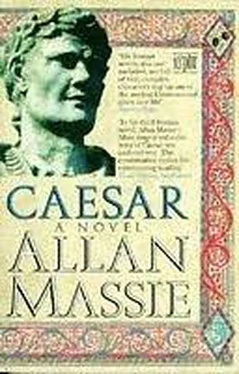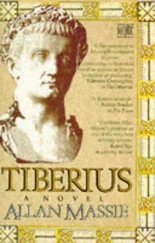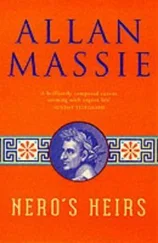Allan Massie - Caesar
Здесь есть возможность читать онлайн «Allan Massie - Caesar» весь текст электронной книги совершенно бесплатно (целиком полную версию без сокращений). В некоторых случаях можно слушать аудио, скачать через торрент в формате fb2 и присутствует краткое содержание. Жанр: Исторические приключения, на английском языке. Описание произведения, (предисловие) а так же отзывы посетителей доступны на портале библиотеки ЛибКат.
- Название:Caesar
- Автор:
- Жанр:
- Год:неизвестен
- ISBN:нет данных
- Рейтинг книги:3 / 5. Голосов: 1
-
Избранное:Добавить в избранное
- Отзывы:
-
Ваша оценка:
- 60
- 1
- 2
- 3
- 4
- 5
Caesar: краткое содержание, описание и аннотация
Предлагаем к чтению аннотацию, описание, краткое содержание или предисловие (зависит от того, что написал сам автор книги «Caesar»). Если вы не нашли необходимую информацию о книге — напишите в комментариях, мы постараемся отыскать её.
Caesar — читать онлайн бесплатно полную книгу (весь текст) целиком
Ниже представлен текст книги, разбитый по страницам. Система сохранения места последней прочитанной страницы, позволяет с удобством читать онлайн бесплатно книгу «Caesar», без необходимости каждый раз заново искать на чём Вы остановились. Поставьте закладку, и сможете в любой момент перейти на страницу, на которой закончили чтение.
Интервал:
Закладка:
"It is a mistake, surely, to judge antiquity by the standards of our own age. Certainly one cannot believe that either the Greeks or the Trojans would have long withstood our legions. Nevertheless, it is barbarous to laugh at them. If men ever cease to be moved by Homer, that will be the time to despair of humanity. Then we will be right to abandon all dreams of greatness. In Homer we see greatness yoked to strange infirmity, honour wrestling with dishonour in a single breast; we see all that is great and ennobling in war, and all that is terrible and abominable too. Is it not a mark of Homer's transcendent power that we weep for both Hector and Achilles? Is it not eternally true — the picture that he offers — of the unending struggle between men's will and the pressing weight of necessity? Yes, Trebonius is right: a modern army would make short work of Troy. On the other hand, what poet of today is capable of moving us as Homer does? For that reason we should venerate the sad remains of Ilium. For that reason, we come here to weep and to pay homage to the glorious dead."
"Bravo, Mouse," Caesar said, and pinched my ear.
And yet, though I knew I had spoken as he wished me to speak, and said the words that he desired to hear, I could not escape the certainty that he was laughing at me, even as he applauded.
"You are becoming quite a little master of rhetoric," Casca said to me that evening.
He sprawled in his tent, with a goblet of wine in his hand. His face was ruddy with drink. Diosippus knelt beside him, between his open knees, massaging his fleshy thighs, while Casca's left hand played with the boy's curls. Nicander stood behind his master, oiling his neck and shoulders, and scowling at Diosippus.
"You have learned how to flatter Caesar," Casca said. I felt myself flush and looked away.
"But I meant all I said, cous in. I cannot endure to hear Tre bonius sneer at Homer. If we abandon trust in poetry, why, then we become…" I paused, searching for words.
"We become sensible men," Casca said. He leaned forward and kissed Diosippus on the mouth. "There is more honey in a boy's lips than in all the words of Homer. But you are wise to flatter Caesar: for your own sake. I only ask you to remember the old proverb: whom the gods wish to destroy, they first make mad."
"What do you mean?"
He stood up, letting the towel that covered his midriff fall to the ground. His belly sagged. He waddled to the couch and lay face down. The boys followed him and resumed their massage. He turned his face towards me:
"Has Caesar spoken of his plans for a new Troy, a new Rome?"
"No, he has said nothing about that. What do you mean?"
"What does he mean? That is the question. Now bugger off, Mouse. You too, Dio. Leave me with Nicky."
He stretched out his hand and thrust it between Nicander's shapely legs, pulling the boy towards him.
We sat on deck under a starry sky. It had been rough and was now calm. My nausea had abated. Caesar was in relaxed and friendly mood. He sipped wine mixed with water and talked of literature, and then idly of philosophy.
Our enterprise was audacious. It had been confirmed that Pompey was in Egypt. Our own force was small. We had perhaps four thousand legionaries and eight hundred cavalry. The islanders of Rhodes had been constrained to furnish us with ten warships. Our intelligence was defective. It was rumoured that Pompey had a considerable fleet, the remnants of those legions which had survived Pharsalus, and some two or three thousand armed slaves. But we couldn't know for sure. He might have had three times that force. Yet Caesar did not appear concerned. He spoke of the effect of the prestige won by Pharsalus. "It is worth two legions," he said.
"I was pleased, Mouse, to hear you speak of Homer as you did. I have never trusted the man who is deaf to poetry."
"Trebonius is a good officer and devoted to your service."
"I would trust him in the field, certainly. But he is a mean fellow, a lean fellow, a crabbit soul. Look at the stars, Mouse, look at the stars. Keep your gaze fixed on them. That is a golden rule of life and politics. The man who forgets the stars is no favourite of Destiny. He is doomed to petty struggles, capable of taking only a short view of things. The stars are my friend, Mouse. Whenever I feel the temptation to despair, I have only to gaze upward on such a night as this to recover my even and confident tenor of mind. Serenity.. " his voice drifted away. We sat in silence, only the waves lapping against the prow.
"What is Rome?" Caesar said. "A city, an idea… has it ever occurred to you to wonder why we Romans have been so favoured by Fortune? Have you considered that all history leads to this moment when Rome is the mistress of the world, and I am Rome's master?"
"Pompey still lives, Caesar, and he has sons with armies."
"Poor Pompey. I was fond of him, you know, Mouse. I truly thought of him as my friend, my last friend… and he betrayed my faith."
"Caesar has many friends."
"Caesar has no friends, for, with Pompey eclipsed, he has no equals, and friendship is possible only between equals. Does that seem very arrogant to you, Mouse?"
There was no land in sight, merely the limitless sea, dark purple shading into dense night, but the stars clear above.
"Answer me, Mouse. Does that seem very arrogant to you?"
But I could not answer. I saw the truth of what he said, and I hated it, and would not acknowledge it.
"Marcus Crassus thought he was my friend, because I owed him so much money. He was only my creditor. You know the story of his death."
Of course I did. Everyone knew it and had been horrified by it, even though at the same time we were ashamed.
Crassus had led his army against Parthia across the great desert of Arabia. Somewhere in the sands, his intelligence faulty, he had found himself surrounded by the horse archers of the enemy. Keeping out of range of our weapons, they had teased Crassus' mighty army like boys baiting a bear tied to a stake. The Romans pressed together. Many fell exhausted by the heat and the congestion. At last, Crassus, never famous for courage, roared (they say) like a wounded bull and led a mad charge. He was stopped by an arrow in the throat. His body was stripped and left for the fowls of the air, the dark birds that cast their shadows over the sands. But his head was cut off and carried to the camp of the Parthian king, who was, as it happened, watching a performance of The Bacchae. (Thus do barbarian kings imitate the practice of civilised men.) When the head of King Pentheus is brought on to the stage, some vile but ingenious actor substituted the head of old Crassus.
Carrhae was the greatest disaster Roman arms had suffered since Hannibal's victory at Cannae almost two hundred years ago. It was strange that Caesar should brood on it now.
"One day," he said, "I shall avenge Crassus."
My mother used to speak with horror of Crassus' campaign against the leader of the slaves' revolt, Spartacus, of how, when he had defeated the slaves, he had six thousand of them crucified along the Appian Way. They lined the road from Capua to Rome. The sight and stench of the bodies, rotting in attitudes that indicated the nature of their agony, disgusted her, she used to say; for eighteen months she had been unable to bring herself to revisit our estates in the south on account of the horror that she would be compelled to see. Why did I think of this now?
"My conquest of Gaul was glorious," Caesar said, "and yet what is Gaul, compared to the splendour of the East? Alexander never thought to carry his conquests to the West. Some day Rome must dominate Parthia. I thought, when we were at Troy, of a new Rome, born from a colony planted there on the site where our race was nurtured. From such a base. After all, Rome cannot be the centre of the world. Things come full circle, Mouse. It may be that my Destiny is to retrace the path taken by my ancestor Aeneas, and then… but I am already twenty years older than Alexander when he died… still, Destiny
Читать дальшеИнтервал:
Закладка:
Похожие книги на «Caesar»
Представляем Вашему вниманию похожие книги на «Caesar» списком для выбора. Мы отобрали схожую по названию и смыслу литературу в надежде предоставить читателям больше вариантов отыскать новые, интересные, ещё непрочитанные произведения.
Обсуждение, отзывы о книге «Caesar» и просто собственные мнения читателей. Оставьте ваши комментарии, напишите, что Вы думаете о произведении, его смысле или главных героях. Укажите что конкретно понравилось, а что нет, и почему Вы так считаете.












